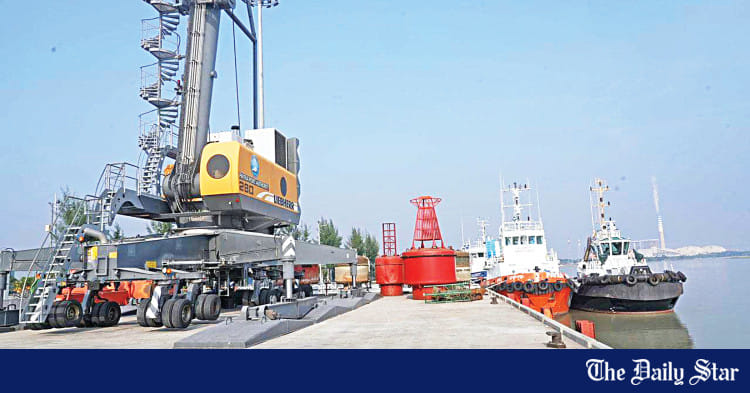Saif
Senior Member
- Joined
- Jan 24, 2024
- Messages
- 17,319
- Likes
- 8,344
- Nation

- Residence

- Axis Group


Payra thermal power plant resumes full production
The Payra 1,320MW Thermal Power Plant in Kalapara upazila of Patuakhali has resumed full production following a roughly two-month halt for maintenance works on its second unit and test runs of a neighbouring facility..Upon completing maintenance works, which began on November 9 last year,
Payra thermal power plant resumes full production
Test runs of neighbouring facility nearly complete

A partial view of Payra port in Patuakhali district. With capital dredging works of Ramnabad channel now complete, only the construction of the first terminal remains for Payra port to become the third fully operational seaport in Bangladesh. PHOTO: Sohrab Hossain
The Payra 1,320MW Thermal Power Plant in Kalapara upazila of Patuakhali has resumed full production following a roughly two-month halt for maintenance works on its second unit and test runs of a neighbouring facility.
Upon completing maintenance works, which began on November 9 last year, the authorities began generating electricity from the second unit of the coal-fired power plant at around 9:30pm on Tuesday.
Now, the plant is supplying its full 1,320-megawatt (MW) capacity to the national grid, according to Shah Moni Jico, assistant manager of the Payra plant.
Meanwhile, the first unit of a neighbouring facility with an identical power generation capacity run by RPCL-NORINCO International Power Limited (RNPL) has been undergoing experimental production since mid-January this year.
As such, the first unit of the Payra plant had also been shut down for a week starting December 16.
The second unit of the new plant, which is located just two kilometres north of the Payra plant, is scheduled to begin production this June.
And with its first unit almost commissioned, the facility will have a total power generation capacity of 1,320MW in full production, thereby meeting 10 percent of the country's demand.
Construction of the RNPCL Thermal Power Plant in Londa village under Kalapara began in 2019. However, the facility was unable to commence production as planned last year for various challenges.
The commissioning of its first unit, which has a power generation capacity of 660MW, will likely be complete within the second week of January, said Mohammad Ashraf Uddin, superintendent engineer of the plant.
He informed that all construction works, including that of the power transmission line and coal transport jetty, are now complete.
The first unit is undergoing trial production, with commercial production expected to begin in March.
Shawkat Osman, executive engineer (mechanical) of the RNPCL power plant, said 1.25 lakh tonnes of coal have been stored at the facility to ensure its uninterrupted production once fully operational.
He added that another 1.65 lakh tonnes of coal is expected to arrive this month.
Osman further said that the cost of each unit of electricity generated by the plant is estimated at Tk 9.
Yang Ling, commercial manager of the RNPCL power plant, assured that the facility was built in compliance with global standards.
"It will use the latest ultra-supercritical technology and is designed to operate without causing harm to the environment," he said.
Test runs of neighbouring facility nearly complete
A partial view of Payra port in Patuakhali district. With capital dredging works of Ramnabad channel now complete, only the construction of the first terminal remains for Payra port to become the third fully operational seaport in Bangladesh. PHOTO: Sohrab Hossain
The Payra 1,320MW Thermal Power Plant in Kalapara upazila of Patuakhali has resumed full production following a roughly two-month halt for maintenance works on its second unit and test runs of a neighbouring facility.
Upon completing maintenance works, which began on November 9 last year, the authorities began generating electricity from the second unit of the coal-fired power plant at around 9:30pm on Tuesday.
Now, the plant is supplying its full 1,320-megawatt (MW) capacity to the national grid, according to Shah Moni Jico, assistant manager of the Payra plant.
Meanwhile, the first unit of a neighbouring facility with an identical power generation capacity run by RPCL-NORINCO International Power Limited (RNPL) has been undergoing experimental production since mid-January this year.
As such, the first unit of the Payra plant had also been shut down for a week starting December 16.
The second unit of the new plant, which is located just two kilometres north of the Payra plant, is scheduled to begin production this June.
And with its first unit almost commissioned, the facility will have a total power generation capacity of 1,320MW in full production, thereby meeting 10 percent of the country's demand.
Construction of the RNPCL Thermal Power Plant in Londa village under Kalapara began in 2019. However, the facility was unable to commence production as planned last year for various challenges.
The commissioning of its first unit, which has a power generation capacity of 660MW, will likely be complete within the second week of January, said Mohammad Ashraf Uddin, superintendent engineer of the plant.
He informed that all construction works, including that of the power transmission line and coal transport jetty, are now complete.
The first unit is undergoing trial production, with commercial production expected to begin in March.
Shawkat Osman, executive engineer (mechanical) of the RNPCL power plant, said 1.25 lakh tonnes of coal have been stored at the facility to ensure its uninterrupted production once fully operational.
He added that another 1.65 lakh tonnes of coal is expected to arrive this month.
Osman further said that the cost of each unit of electricity generated by the plant is estimated at Tk 9.
Yang Ling, commercial manager of the RNPCL power plant, assured that the facility was built in compliance with global standards.
"It will use the latest ultra-supercritical technology and is designed to operate without causing harm to the environment," he said.








































